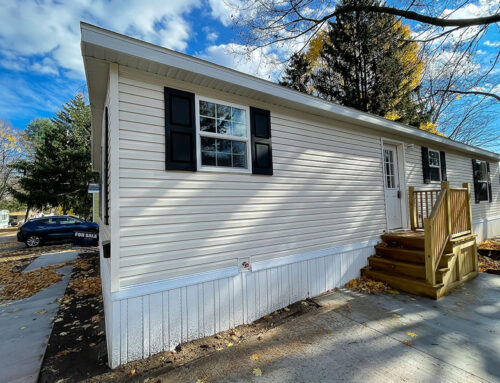When I met my friend, Wes, for dim sum the other day, I could barely hear him over the noise. We weren’t far from College Point Boulevard in Flushing, where development on a new mixed-use facility was underway, and the sound of construction seemed to reverberate through the cafe. We were there to talk about whether or not he should buy income property in Queens, something he’d been thinking about since neighborhoods like Flushing started making New York City’s up-and-coming lists. He’s not a new investor, but he doesn’t have experience investing in rentals like I do. So, we chatted about the rental market in Queens and if he should jump on board—that is, after we found a quieter spot to talk. Let me share how our chat went.
Should You Buy Income Property in Queens, NY?
A walk down almost any street in Queens leads you to a new construction site or the conversion of an existing building. For those of us who live and work here, the new sights and sounds come as no surprise. Several neighborhoods, like Astoria and Long Island City, have made multiple top-ten lists of the best places to live in New York for a couple of years running. Crime keeps dropping in neighborhoods like Bayside, and it’s been easier to find good school districts in the borough overall.
Plus, throughout New York City, the economy is booming and the job market is more robust than ever. This means that people are better able to pay their bills. For landlords who prefer to avoid dealing with evictions, and who generally like to keep vacancy rates low, this comes as very good news. It’s much less expensive, and certainly less of a hassle, to renew existing leases with good-paying tenants than it is to market to new ones. So, because the majority of residents in Queens are renters—over 56%, according to the U.S. Census Bureau—it follows that the majority of local landlords should be in the green.
Except, the reality is that landlords seem to be struggling. So far, this year appears to be the year of landlord concessions throughout New York. Northwest Queens, in particular, has set a new record: concessions are up above 50% from 38.5% last year, according to the appraisal and consulting firm Miller Samuel, Inc. These concessions, which often take the form of free rent, reduced rents, and the absorption of broker’s and other fees, are designed to fill vacancies in a competitive market where there is a glut of new development that’s outstripped demand—like New York generally and Queens specifically. These concessions have helped to increase the number of new leases in Queens by 43.2% since January of last year. But, inventory continues to rise, largely because of new developments, and median rental prices continue to drop as a result.
In addition, potential renters are reading the fine print on leases and using the high vacancy rates, as well as the concessions offered by competing landlords, to negotiate better terms before signing. If they don’t get the terms they want, they move on. But, when they do, that doesn’t necessarily mean they’ll stick around. Some media outlets are reporting that renters are jumping around from lease to lease, taking advantage of the free and reduced rents and leaving landlords to pay the difference.
Of course, that’s not the only problem with concessions. By conceding to free or lower rents and other benefits, many landlords put themselves at risk for signing on tenants who, ultimately, can’t afford to pay. When the market rate on the lease kicks in after the concession period ends—which is sometimes as little as one to three months—tenants often find the reality of paying a higher rent difficult, even impossible. Then, for landlords, it’s back to square one: evicting bad tenants and trying to find good ones. It costs both money and time to find good tenants, especially in a weakening rental market where there is a lot of competition.
There are also other aspects of being a landlord that can make it more trouble than it’s worth. For example, the expense of regular maintenance and repairs on older units in New York can be substantial. And, your landlord responsibilities in winter can be especially grueling—even pricey—if you’re having to shovel snow, fix frozen pipes, or replace a roof. Your liability as a landlord is higher too. So, if your unit is not up to code or someone is injured at the property, you could be held accountable. And, in a renter’s market where potential tenants are scrutinizing every last detail about the rental and you can’t afford to slip up.
Rather than deal with all the problems that buying income property in Queens can hand you, buying, renovating, and selling houses can help you achieve better returns with less risk. Homeowners fall into financial duress for a number of reasons—job loss, illness, or a death in the family—and often end up unable to pay their mortgages. With mortgage rates going up alongside the recent caps on federal property tax deductions, the number of distressed homeowners will likely increase. If you have a way to find these motivated sellers, you’ll have the opportunity to get some good deals, rehab, and sell them. And, you won’t have to offer free rent to make it happen.
The Best Tools and Resources for Achieving a Better Potential ROI
Years ago, I invested in a few rentals. But, ultimately, I decided that buying houses to rehab and sell is less of a hassle and offers a better potential ROI. I’d quickly grown tired of running around town to handle late-night emergencies and the stress that keeping up my units was causing. When I realized I was in danger of becoming one of the distressed property owners I now help, I let the units go. For Wes, I think this point especially was the last nail in the coffin, so to speak. He decided he’d stay focused on buying from distressed homeowners too and leave the rentals for someone else to worry about.
He also decided to become an independently owned and operated HomeVestors® franchisee, like me. HomeVestors has the marketing tools and resources to drive distressed homeowners to local franchisees who can help them leave the homes they can’t afford. So, there’s never a need to worry about getting the leads on properties from homeowners who have found themselves in “ugly situations” that you need to build your business. And, that’s really all that Wes was looking for—a better way to build his real estate investing business.
Does that sound like you, too? If it does, contact HomeVestors® about the franchise opportunities in your corner of New York today.
Each franchise office is independently owned and operated.
Contact
"*" indicates required fields





